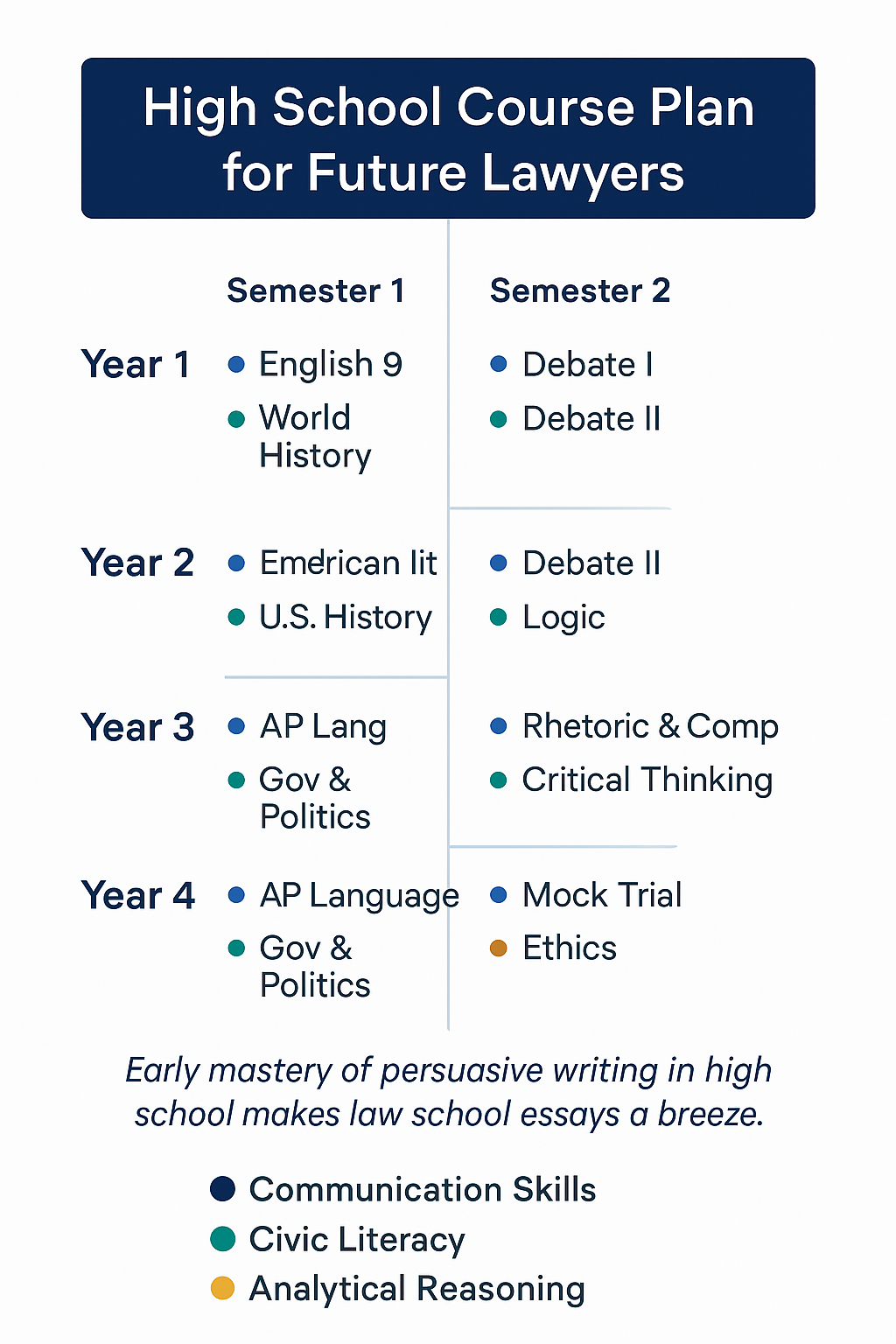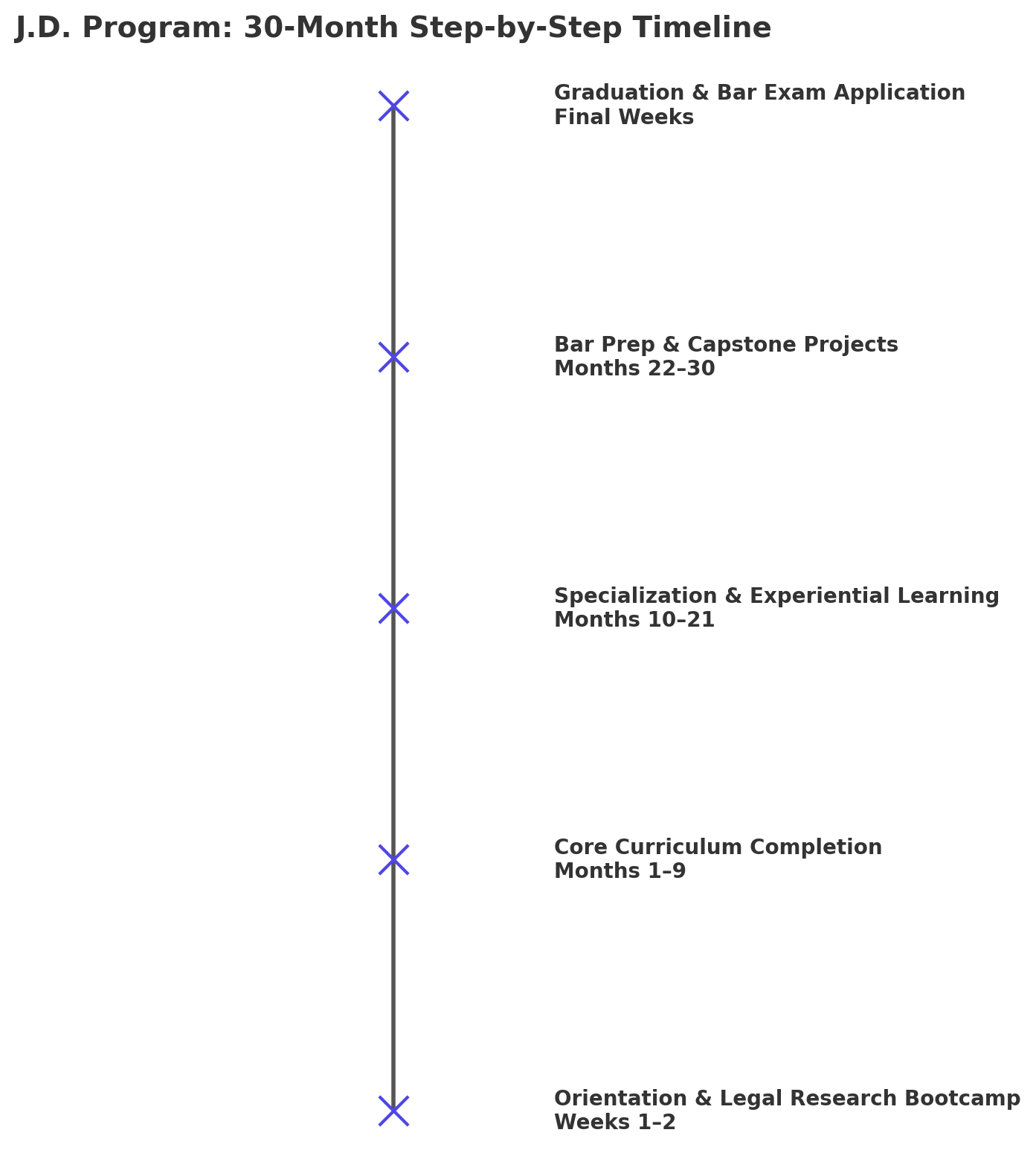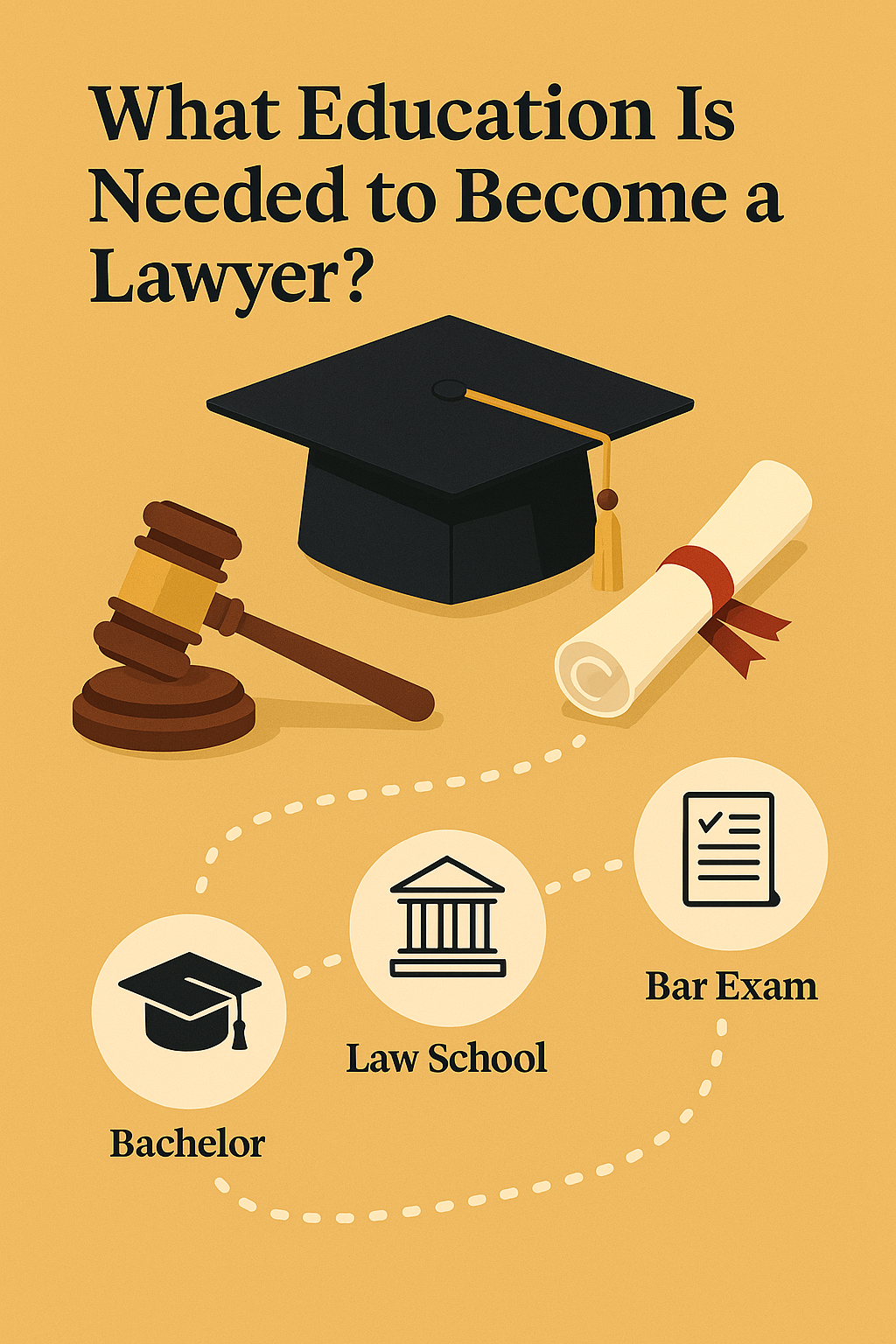What Education Is Needed to Become a Lawyer in the U.S.?
Quick Answer: To become a lawyer in the U.S., you generally follow a 7-year pathway: earn a 4-year bachelor’s degree (in any field), complete a 3-year J.D. at an ABA-accredited law school, then pass the bar exam (Multistate Bar Exam + state-specific components) and satisfy character & fitness requirements. Some jurisdictions—like Virginia—also permit law office apprenticeships in lieu of law school, offering alternative admission routes for aspiring attorneys.
High School Foundations
“What high school education do you need to become a lawyer?”
Answer:
Strong performance in English (literature, composition), U.S. government, world history, debate, and critical thinking courses lays the groundwork for the analytical reading, persuasive writing, and argumentation skills every successful lawyer needs.
Why It Matters:
- English & Composition: Develops clear, concise writing and close reading—essential for drafting briefs and interpreting statutes.
- Government & Civics: Builds familiarity with constitutional principles, legislative processes, and civil rights history.
- History: Cultivates pattern recognition and contextual analysis, helping you understand how precedents evolve.
- Debate & Public Speaking: Sharpens your ability to craft logical arguments, rebut opposing views, and speak confidently under pressure.
- Critical Thinking & Philosophy: Teaches you to dissect complex problems, evaluate evidence, and approach issues from multiple angles.
“Early mastery of persuasive writing in high school makes law school essays a breeze.”

Related:
How to Study for the LSAT?
Which of These Statements Was Implied by the Decision in Brown v. Board of Education?
Undergraduate Degree & Pre-Law Preparation
“What education do most lawyers have?”
In the U.S., virtually every lawyer begins with a 4-year bachelor’s degree, though law schools welcome applicants from a wide array of academic backgrounds. Rather than focusing on a “pre-law” major, admissions committees look for rigorous coursework and strong grades. Here are the most common pathways:
- Political Science: Offers direct exposure to constitutional law, public policy, and comparative government—foundational topics for understanding how laws are made and applied.
- Finance or Economics: Cultivates numerical literacy and teaches you to analyze complex data sets—skills increasingly valuable in corporate, tax, and securities litigation.
- Philosophy: Strengthens logical reasoning and ethical argumentation by training you to dissect abstract concepts, construct airtight syllogisms, and navigate thorny moral dilemmas.
- English & Communications: Polishes written and oral advocacy through intensive literature analysis, persuasive essay writing, and public-speaking exercises—core activities that mirror legal brief drafting and courtroom presentation.
Law schools prize students who demonstrate intellectual curiosity, regardless of major. Excelling in challenging courses—such as advanced calculus, statistics, or a second language—can further distinguish your application by proving your capacity for complex problem-solving.
Related:
What is the Meaning of ESL?
How to Increase Your Focus?
Essential Pre-Law Activities
Academic performance alone won’t guarantee admission; you need practical experiences that showcase your passion for the law. Admissions officers look for concrete evidence of your commitment and aptitude:
- Debate Team & Mock Trial: Competing in regional and national tournaments teaches you to craft persuasive arguments on tight deadlines, respond point-by-point to opponents, and gain comfort with public performance—precisely the skills you’ll use in moot courts and actual litigation.
- Law Firm Internships: Even a single summer internship or part-time clerkship lets you observe attorney-client interviews, draft memos, and assist with case research. These experiences deepen your understanding of day-to-day legal practice and help you build professional references.
- Research Assistantships: Partnering with a professor on legal scholarship or policy analysis hones your ability to locate precedents, synthesize case law, and contribute to publishable work—strong evidence of your writing prowess and attention to detail.
- Volunteer & Leadership Roles: Serving in campus legal clinics, local legal aid organizations, or student government demonstrates social responsibility and leadership—qualities that law schools and future employers value highly.
“Join your campus Pre-Law Society early. Beyond co-curricular events, these groups often host law-firm panels, alumni mixers, and application-workshop sessions that can give you insider tips and vital networking connections.”
Fact Box:
Over 60% of students entering ABA-accredited law schools majored outside political science, highlighting that diverse academic backgrounds enrich legal education and practice.
Juris Doctor (J.D.) Curriculum & Timeline
Year-by-Year Breakdown
1L Core Courses (Year 1)
Your first year lays the bedrock of legal reasoning. You’ll spend most days in large lecture halls dissecting landmark cases, then regroup in small sections for discussion and skills labs.
- Contracts: Learn the art of drafting and interpreting agreements. You’ll examine real-world disputes—like non-compete enforceability or breach of warranty—and draft contract clauses in writing exercises.
- Torts: Explore how the law compensates victims of personal or property harm. Expect case studies ranging from slip-and-fall accidents to product-liability claims.
- Civil Procedure: Master the rules governing lawsuits: how to file a complaint, respond with motions, and navigate discovery disputes. This course feels like learning the rulebook of every courtroom.
- Criminal Law: Delve into societal values reflected in criminal statutes. Engage in debates on self-defense, insanity defenses, and the evolving scope of white-collar crime.
- Legal Research & Writing: Spend your first weeks in the library learning Westlaw/LexisNexis. By semester’s end, you’ll draft memoranda and persuasive briefs, cementing your ability to translate complex law into clear prose.
2L Specializations (Year 2)
Year 2 shifts from theory to practice. You’ll tailor your path toward the areas that excite you most.
- Clinical Programs: Work with real clients under supervision—draft motions, negotiate plea deals, or counsel tenants at housing courts. Clinics deepen both your competence and confidence.
- Moot Court & Mock Trial: Hone appellate advocacy and trial techniques. You’ll write full‐length briefs and argue before panels of judges, often traveling for regional competitions.
- Elective Tracks: Choose specialized seminars—from Intellectual Property to Environmental Law—taught by practitioners who bring current challenges into the classroom.
- Skills Workshops: Participate in negotiation practicums and transactional drafting labs, where you’ll role-play cross-border mergers or labor contracts.
3L Capstones (Year 3)
Your final year integrates everything you’ve learned and gears you up for practice.
- Advanced Seminars: Dive deeply into niche topics—such as international arbitration—where small class sizes foster rigorous debate.
- Externships & Judicial Clerkships: Spend a semester at a federal judge’s chambers drafting opinions, or at a public-interest firm shaping policy memoranda.
- Bar Preparation Courses: Enroll in a for-credit bar‐prep sequence. Mornings are MBE-focused multiple-choice drills; afternoons are dedicated to essay and Performance Test simulations under timed conditions.
- Professional Development: Attend weekly career panels—alumni describe first-year associate life, sharing pitfalls and networking strategies that textbooks don’t cover.

Check:
What is the Average Cost of College?
How to Learn Computers?
Bar Exam & Licensing Process
“What education is needed to become a lawyer?”
Answer: After earning your J.D. from an ABA-accredited law school, you must clear your jurisdiction’s bar exam—which typically includes the Multistate Bar Examination (MBE), state-specific essay questions, and a performance test—and also pass a separate Multistate Professional Responsibility Examination (MPRE). Finally, you’ll complete a character & fitness evaluation to demonstrate honesty, competence, and ethical fitness to practice law.
Bar Exam Breakdown
- Multistate Bar Examination (MBE):
- 200 multiple-choice questions covering Contracts, Torts, Constitutional Law, Criminal Law & Procedure, Evidence, and Real Property.
- Administered over one day in two 100-question sessions.
- State-Specific Essays & Multistate Performance Test (MPT):
- Essays: Jurisdictional questions that test your ability to analyze facts, cite relevant law, and craft persuasive written responses.
- MPT: Simulations of real-world lawyering tasks (e.g., drafting a memo or client letter) under timed conditions.
- MPRE Requirement for Ethics:
- A separate, two-hour, 60-question multiple-choice exam on professional conduct.
- Most states require a scaled score between 75–85 for admission.
Average first-time MBE pass rate: 70%–80% depending on jurisdiction.
“Start bar prep in your 3L year—spread the study load across fall and spring semesters, then intensify review after graduation to avoid burnout and maximize retention.”
Specializations & Career Outlook
“Which lawyer is the highest paid?” / “What type of lawyer is the highest paid?”
In major U.S. legal markets, the top earners tend to be:
- Big Law Corporate Partners: Equity partners at the largest firms routinely bill $1,000+ per hour and share in multimillion-dollar firm profits—average partner compensation can exceed $3 million annually.
- Patent & Intellectual Property Attorneys: With technical backgrounds (often in engineering or life sciences), these specialists command premium rates—$400–$800 hourly at leading firms—due to the complexity of patent prosecution and litigation.
- High-Stakes Trial Lawyers: Litigators handling billion-dollar class actions, securities fraud, or catastrophic injury cases often earn contingency fees or hourly rates exceeding $1,200, reflecting the risks and stakes involved.
These roles require not only exceptional legal skill but also deep industry knowledge, extensive networks, and the ability to manage multi-million-dollar cases.
“What field of law is most in demand?”
Current and projected demand (2025–2030) is strongest in:
- Health Care Compliance & Regulatory Law (Projected growth: +12%)
- Hospitals and life-sciences companies need counsel to navigate FDA approvals, privacy rules (HIPAA), and reimbursement policies.
- Data Privacy & Cybersecurity Law (Projected growth: +15%)
- Rising global regulations (GDPR, CCPA) drive demand for lawyers who can draft privacy policies, manage breach responses, and advise on AI ethics.
- Environmental & Energy Law (Projected growth: +9%)
- Climate-change regulations and clean-energy mandates create opportunities in permitting, litigation, and policy advocacy.
- Fintech & Financial Services Regulation (Projected growth: +14%)
- Blockchain, digital payments, and decentralized finance platforms require specialized counsel to handle evolving securities and banking laws.

Earnings Pathway (“How to make $500,000 as a lawyer?”)
Achieving a half-million annual income typically follows a strategic career progression:
- Associate (Years 1–4): Build your reputation—top associates in Big Law can earn $200,000–$300,000 base before bonuses.
- Senior Associate / Counsel (Years 5–8): Take on leadership of complex matters; compensation rises to $300,000–$400,000 with performance bonuses and origination credit.
- Equity Partner (Year 9+): Share in firm profits—equity partners at Am Law 100 firms often exceed $500,000 in annual draws.
- In-House & Boutique Leadership: General counsel or boutique firm founders focusing on high-value niches (e.g., IP or M&A) can surpass $500,000 through salary plus stock or profit-sharing arrangements.
“Cultivate specialization early—deep expertise in a high-growth field lets you command premium rates and accelerates your path to partner or in-house leadership.”
Frequently Asked Questions
What education do most lawyers have?
Most lawyers in the U.S. hold a four-year bachelor’s degree—often in fields like political science, economics, or English—followed by a three-year J.D. from an ABA-accredited law school.
Do lawyers make $1,000 an hour?
Top-tier attorneys—such as equity partners at major firms or specialized trial and patent lawyers—can bill $1,000 + per hour, but the average hourly rate for new associates is typically $150–$300.
What high school education do you need to become a lawyer?
Strong performance in English, U.S. government, history, debate, and critical thinking courses lays the groundwork for legal reasoning and persuasive writing skills essential for law school.
What type of lawyer is the highest paid?
Equity partners in Big Law firms generally earn the highest salaries, followed by patent attorneys and high-stakes litigators who command premium hourly rates.
Which lawyer is the highest paid?
In terms of individual earnings, equity partners at Am Law 100 firms and senior litigators in high-value practice areas (e.g., securities, class actions) top the pay scales, often exceeding $1 million annually.
Is law school difficult?
Yes—law school demands rigorous reading (200+ pages daily), Socratic-method participation, and intensive legal writing, but strong undergraduate preparation and time management make the transition smoother.
Who is the richest lawyer?
Historically, lawyers-turned-business magnates like Wachtell Lipton co-founder Martin Lipton and former New York Mayor Rudy Giuliani have reached billionaire status, though most high-earning partners remain in the $1–$5 million range.
What is the highest paying job in the world?
Outside of law, C-suite executives in finance, hedge-fund managers, and specialized medical surgeons rank highest; within law, top partners and general counsels at Fortune 500 companies lead the field.
What field of law is most in demand?
Data privacy, fintech regulation, and health-care compliance are the fastest-growing specialties—driven by evolving regulations and technological advances.
How to make $500,000 as a lawyer?
Advance from junior associate to senior associate, develop a niche expertise, secure client origination credit, and then ascend to equity partner or high-level in-house counsel roles.
What is the difference between lawyer and attorney?
A “lawyer” is anyone who has earned a law degree, whereas an “attorney” is a lawyer who is licensed to practice law and represent clients in court.

